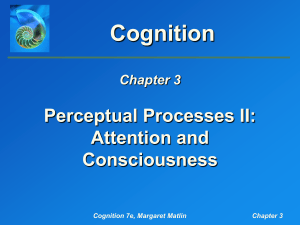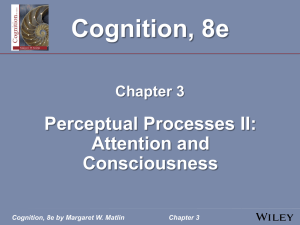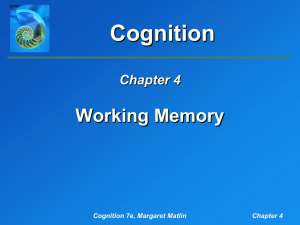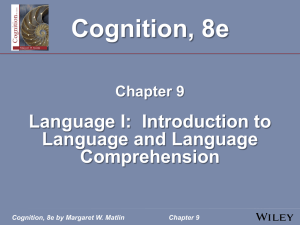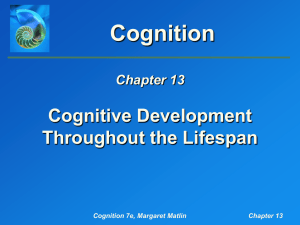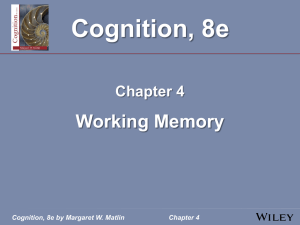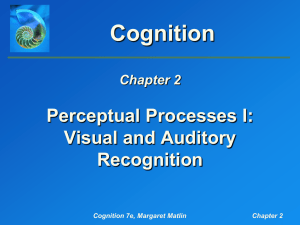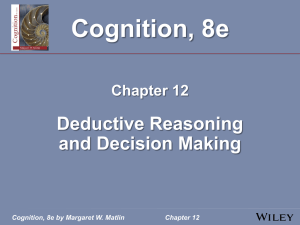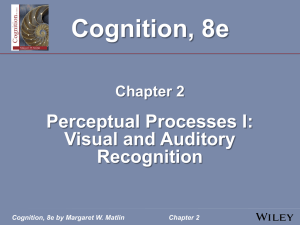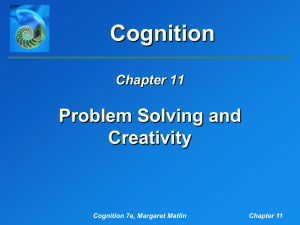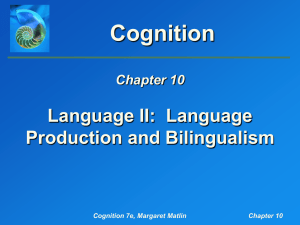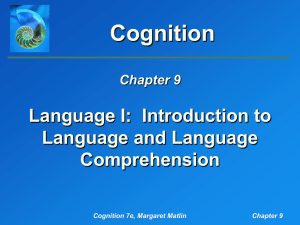Cognition, 8e by Margaret W. Matlin Chapter 6 Metacognition
advertisement
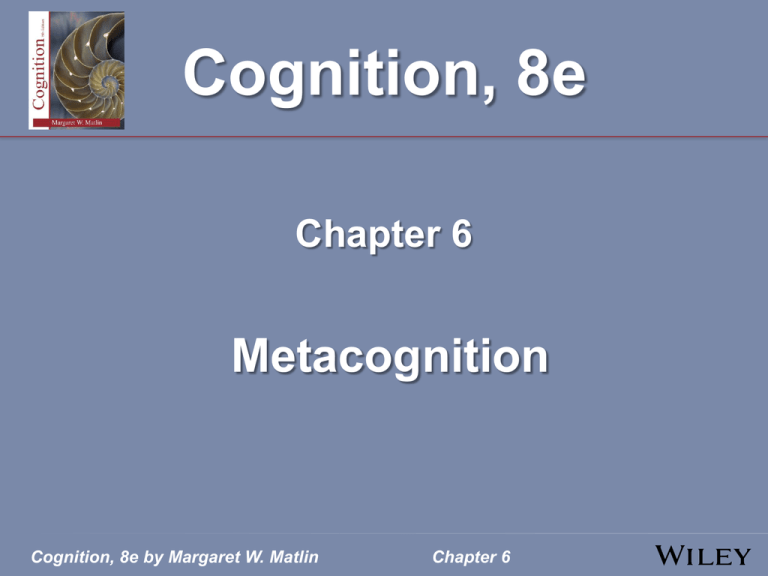
Cognition, 8e Chapter 6 Metacognition Cognition, 8e by Margaret W. Matlin Chapter 6 Metacognition metacognition • your knowledge and control of your cognitive processes • supervises the way you select and use your memory strategies • includes self-knowledge, metamemory, metacomprehension Cognition, 8e by Margaret W. Matlin Chapter 6 Metacognition Factors that Influence People's Metamemory Accuracy Metamemory: Estimating the Accuracy for Total Score Versus the Accuracy for Individual Items • In general, people tend to be overconfident if you ask them to predict their total score on a memory test. Cognition, 8e by Margaret W. Matlin Chapter 6 Metacognition Factors that Influence People's Metamemory Accuracy Metamemory: Estimating the Accuracy for Total Score Versus the Accuracy for Individual Items • In contrast, people tend to be accurate if you ask them to predict which individual items they will remember and which ones they will forget. Cognition, 8e by Margaret W. Matlin Chapter 6 Metacognition Factors that Influence People's Metamemory Accuracy Metamemory: Estimating the Accuracy for Total Score Versus the Accuracy for Individual Items foresight bias—when people overestimate the number of answers that they will supply on a future test Studying with the correct responses visible can lead to overly optimistic estimates. Cognition, 8e by Margaret W. Matlin Chapter 6 Metacognition Factors that Influence People's Metamemory Accuracy Metamemory: Estimating the Accuracy for Total Score Versus the Accuracy for Individual Items Dunning and coauthors (2003) • estimate of total score after finishing exam • less competent students overestimated performance Cognition, 8e by Margaret W. Matlin Chapter 6 Cognition, 8e by Margaret W. Matlin Chapter 6 Metacognition Factors that Influence People's Metamemory Accuracy Metamemory: Estimating the Score Immediately Versus After a Delay • People do not provide accurate memory estimates for individual items, if they make these estimates immediately after learning the items. • In contrast—if they delay their judgments— they are reasonably accurate in predicting which items they will recall. Cognition, 8e by Margaret W. Matlin Chapter 6 Metacognition Metamemory About Factors Affecting Memory Accuracy Many students lack knowledge of memory strategies. "All memory strategies are not created equal." Students may believe that some factors do have an effect on memory, although these factors actually do not have an effect. Cognition, 8e by Margaret W. Matlin Chapter 6 Metacognition Metamemory and the Regulation of Study Strategies • coordinate memory and decision making • remember to spend more time on difficult material Cognition, 8e by Margaret W. Matlin Chapter 6 Metacognition Metamemory and the Regulation of Study Strategies Allocating Time When the Task is Easy Nelson and Leonesio (1988) • examined how students distribute their study time when they can study at their own pace • Students allocated more study time for the items that they believed would be difficult to master. Cognition, 8e by Margaret W. Matlin Chapter 6 Metacognition Metamemory and the Regulation of Study Strategies Allocating Time When the Task is Easy Nelson and Leonesio (1988) (continued) • Students spend longer than necessary studying items they already know, and not enough time studying the items they have not yet mastered. Cognition, 8e by Margaret W. Matlin Chapter 6 Metacognition Metamemory and the Regulation of Study Strategies Allocating Time When the Task is Easy Son and Metcalfe (2000)—Students spend more time on difficult items in studies examining relatively easy material like learning pairs of words. Cognition, 8e by Margaret W. Matlin Chapter 6 Metacognition Metamemory and the Regulation of Study Strategies Allocating Time When the Task is Difficult Son and Metcalfe (2000) • test material—a series of eight encyclopedia-style biographies • time pressure—only 30 minutes to study • rank the biographies in terms of difficulty Cognition, 8e by Margaret W. Matlin Chapter 6 Metacognition Metamemory and the Regulation of Study Strategies Allocating Time When the Task is Difficult Son and Metcalfe (2000) (continued) • Students spent the majority of their study time on the biographies they considered easy, rather than those they considered difficult. Cognition, 8e by Margaret W. Matlin Chapter 6 Metacognition Metamemory and the Regulation of Study Strategies Allocating Time When the Task is Difficult Other studies also indicated that when facing time pressure, students choose to study material that seems relatively easy to master. Experts concentrate their time on more challenging material, compared to novices. Cognition, 8e by Margaret W. Matlin Chapter 6 Metacognition Metamemory and the Likelihood of Remembering a Specific Target 1. The tip-of-the-tongue effect—subjective experience of knowing the target word for which you are searching, but cannot recall it right now; generally an involuntary effect 2. The feeling-of-knowing effect—subjective experience of knowing some information, but cannot recall it right now; more conscious experience Cognition, 8e by Margaret W. Matlin Chapter 6 Metacognition Metamemory and the Likelihood of Remembering a Specific Target The Tip-of-the-Tongue Effect Brown and McNeill (1966) (continued) • Similar sounding words did indeed resemble the target words in terms of firstletter and/or other attributes like number of syllables. Cognition, 8e by Margaret W. Matlin Chapter 6 Metacognition Metamemory and the Likelihood of Remembering a Specific Target The Tip-of-the-Tongue Effect Later Research • often accompanied by nonverbal behaviors (e.g., exaggerated facial expression, foot movements); an example of embodied cognition (thoughts expressed as motor behavior) Cognition, 8e by Margaret W. Matlin Chapter 6 Metacognition Metamemory and the Likelihood of Remembering a Specific Target The Feeling-of-Knowing Effect • predicting whether you could correctly recognize the correct answer to a question • related to the amount of partial information retrieved Cognition, 8e by Margaret W. Matlin Chapter 6 Metacognition Metacomprehension metacomprehension—thoughts about language comprehension Metacomprehension Accuracy College students • are not very accurate in metacomprehension skills • may not notice inconsistencies or missing information in a passage Cognition, 8e by Margaret W. Matlin Chapter 6 Metacognition Metacomprehension Metacomprehension Accuracy College students • believe they have understood something because they are familiar with its general topic • fail to retain specific information • overestimate how they will perform when tested Cognition, 8e by Margaret W. Matlin Chapter 6 Metacognition Metacomprehension Metacomprehension Accuracy Pressley and Ghatala (1988) • reading comprehension using SAT; essay followed by multiple-choice questions • students rated how certain they were that they had answered each question correctly • little difference between estimates on correct and incorrect items Cognition, 8e by Margaret W. Matlin Chapter 6 Metacognition Metacomprehension Metacomprehension Accuracy Pressley and Ghatala (1988) • students believed that they understood the material, even when they answered the questions incorrectly Cognition, 8e by Margaret W. Matlin Chapter 6
